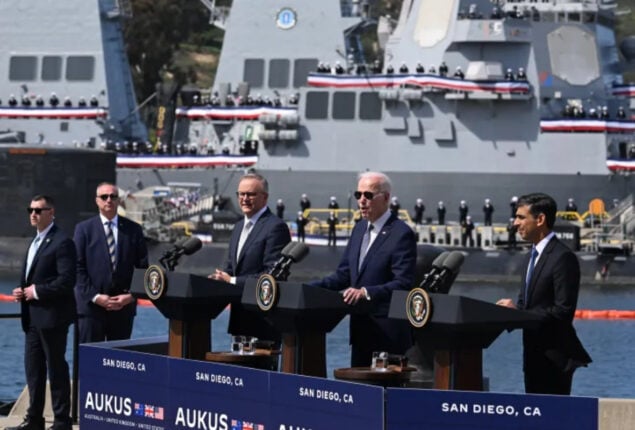Aukus: Rishi Sunak in US to finalize defence pact
The 2021 Aukus accord attempts to address the three countries. The meeting...

Aukus deal: US, UK, Australia reach agreement on nuclear submarine project
The presidents of the US, UK, and Australia have released new information about their strategy for building a fleet of nuclear-powered submarines of the newest generation.
According to the Aukus pact, the US must initially give Australia at least three nuclear-powered submarines.
The allies will also collaborate to build a new fleet employing state-of-the-art technology, including reactors built by the UK’s Rolls-Royce.
The agreement aims to reduce China’s sway in the Indo-Pacific area.
US President Joseph Biden emphasized that the boats would not have nuclear weapons and would not put Australia’s resolve to being a nuclear-free country in jeopardy when he spoke with the other leaders in San Diego, California.
The following is a summary of the information presented in the presentation.
Before Australia purchases three US Virginia-class submarines in the early 2030s with the option to buy two more, the US and UK will base a small number of nuclear submarines at a RAN facility in Perth, Western Australia, beginning in 2027.
Next, a brand-new nuclear-powered submarine called SSN-AUKUS will be designed and constructed for the navies of the UK and Australia.
The technology for this attack ship will come from all three nations, but it will be constructed in Australia and Britain following a British design.
Australia will have submarines that can go farther and faster than its current fleet, equipped with cruise missiles that can hit targets on land and at sea, thanks to the interim and future boats.
According to President Biden, all three nations are dedicated to ensuring that the region is free and open. Anthony Albanese, the prime minister of Australia, and Rishi Sunak, the prime minister of the United Kingdom, stood on either side of him.
“Forging this new partnership, we’re showing again how democracies can deliver our own security and prosperity… not just for us but for the entire world,” he said.
As part of the announcement made on Monday, the US also promised to invest a total of $4.6 billion (£3.7 billion) over the following few years to increase its capacity for building submarines and to enhance maintenance of its Virginia-class submarines.
Anthony Albanese of Australia claimed that the submarine proposal would result in the “biggest single investment in Australia’s defense capability in all of its history” and that it would also generate thousands of new employment.
Mr. Albanese declared, “This will be an Australian sovereign capacity, led by the Royal Australian Navy and – supported by Australian workers in Australian shipyards, with building to begin this decade.
He added that the agreement represents only the second occasion in history—and the first in 65 years—that the US has shared its nuclear propulsion technology.
The problems with global stability, according to UK Prime Minister Sunak, have only gotten worse in the 18 months since the pact was announced.
The illegal invasion of Ukraine by Russia, China’s escalating aggressiveness, Iran’s behavior that is destabilizing the world, and North Korea’s actions all pose a threat to a world that is marked by danger, chaos, and division.
Mr. Sunak also promised to enhance defense spending by roughly £5 billion ($6 billion) over the following two years to tackle challenges from hostile governments as part of his visit to the US.
China has frequently criticized the treaty. Last week, Mao Ning, a spokesperson for Beijing’s foreign ministry, repeated Beijing’s stance that the agreement “undermines peace and stability in the Asia-Pacific region” and runs the risk of sparking an arms race.
“We urge the United States, Britain, and Australia to abandon the Cold War mentality and zero-sum game, faithfully fulfill their international obligations and do more to contribute to regional peace and stability,” he said.
US National Security Adviser Jake Sullivan emphasized that Washington had no plans to forge a new alliance akin to Nato in response to worries that the West would increase its Indo-Pacific military footprint.
The agreement has not been without political repercussions, despite the fact that all three leaders have been quick to emphasize how it will improve their cooperation and contribute to global stability.
Australia abandoned a lucrative submarine deal with France in 2021 in favor of the trilateral accord, which strained relations with Paris politically.
The deal’s strategic significance and the fact that it would create thousands of jobs are both being praised by the Australian government.
Yet, our source continues, the nation must engage in some extremely delicate diplomacy moving forward.
The key question is whether Australia can deepen its military connections with the US while still forging closer economic ties with Beijing, as China is its main trading partner.
According to the government, Aukus might cost Australia A$368 billion (£201 billion) over the following three decades.
The location of a future east coast submarine facility has not been decided, but Port Kembla near Wollongong, 100 kilometres (62 miles) south of Sydney, is considered a possible candidate.
A local authority there claimed that the potential presence of a nuclear submarine facility nearby frightened the locals.
Councilwoman Cath Blakey of the Greens party expressed concern to the Australian Broadcasting Corporation that it would turn us into a military target.
“I think it’s a potential sovereign risk to Australia to be hitching ourselves to the US and the UK.”
Catch all the World News, Breaking News Event and Latest News Updates on The BOL News
Download The BOL News App to get the Daily News Update & Follow us on Google News.